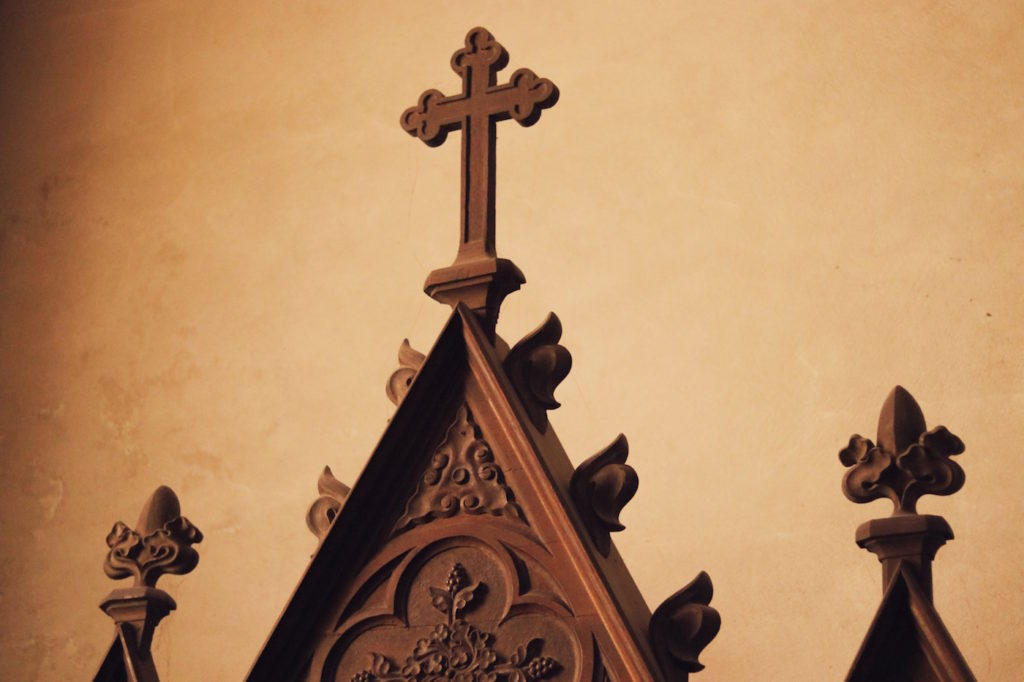Politics in the United States has, from the nation’s founding, been vexed by the question of Catholicism. At the outbreak of the American Revolution, the Continental Congress justified taking up arms in part by citing Britain’s formal acknowledgment of Catholicism—“a despotism dangerous to our very existence”—in neighboring Canada. A half century later, the first great influx of Catholic immigrants precipitated riots in Philadelphia and elsewhere. Even in the twentieth century, anti-Catholic pamphlets were mailed to tens of millions of American households during the presidential candidacies of Alfred E. Smith and, later still, John F. Kennedy.
In such light, it is hardly surprising that anti-Catholicism is called “one of our nation’s oldest vices,” and even “the most luxuriant, tenacious tradition of paranoiac agitation in American history.” It is perhaps also unsurprising, then, that it has not entirely died out. It is, with some regularity, still described as “the last acceptable prejudice.” Echoes of its rhetoric have recently been heard, for example, in context of the judicial nominations of Amy Coney Barrett, Brett Kavanaugh, and Brian Buescher. This has prompted cries about “religious ignorance and bigotry,” “anti-Catholic hysteria,” a “new McCarthyism,” and the informal imposition of religious tests.
The Changing Fortunes of American Catholicism
Some things have changed, of course. Catholics’ antagonists tend now to be secular and progressive rather than Protestant and fundamentalist. But more interesting—and more complicating—are the changes that have taken and are taking place within Catholicism itself. Reflecting on the situation in the 1960s, for example, Damon Linker has written:
Start your day with Public Discourse
Sign up and get our daily essays sent straight to your inbox.Yes, anti-Catholic prejudice contributed to the nation’s concerns about Kennedy’s campaign, but prejudice was not their only source. The political history of pre–Vatican II Catholicism—with its overt hostility to democracy, liberalism, toleration, modernity, and religious “error,” as well as its emphasis on the absolute authority of the pope in matters of faith and morals—raised perfectly legitimate questions about what it would mean for the United States to elect a Catholic to the nation’s highest office.
Kennedy himself attempted to answer those questions not by explaining or defending Catholic teaching, but by invoking the public-private distinction that has become a staple of subsequent politicians. In a 1959 interview Kennedy offered that, “Whatever one’s religion in private life may be, for the office-holder, nothing takes precedence over his oath to uphold the Constitution and all its parts.” He doubled-down on this point in his better-remembered Houston speech of the following year, insisting that his faith would not determine public policy, but was merely his “own private affair.”
If Kennedy’s sentiment was atypical of Catholicism in 1960, the ostensibly liberalizing influence of the same decade’s Second Vatican Council convinced many Americans—Catholic and Protestant, conservative and progressive—that it was the new norm. The tacit understanding was that the old ideal of confessional states that severely restricted or even prohibited non-Catholic religious expression was, if not expressly repudiated, at least quietly dropped, becoming a distant memory.
The combined effects of Camelot and the Council were to make political anti-Catholicism gauche almost overnight. Nobody, therefore, is surprised today when conservative Catholics and liberal non-Catholics alike respond to any hint of it by insisting that “religion is not the issue. Fidelity to the rule of law is what matters,” or that one should only “criticize jurisprudence and ideas, not religious faith or practice.” Given this apparent consensus, suggestions that one’s “dogma” is a “concern” inevitably sound like an unfortunate throwback to an uglier era of American politics.
A Consensus Complicated
Complicating this conclusion, though, is that there is no real consensus. Confusing things further is the matter of where, in recent years, the most vocal dissent is to be heard. Consider the following quotation: “it is not ‘bigotry’ to question whether someone is ill-suited for high office on account of his beliefs. . . . Bigotry presupposes irrational antagonism.” The logic sounds like that of a nineteenth-century Protestant pamphleteer attempting to justify his political prejudices with “rational” reference to Catholicism’s “overt hostility to democracy, liberalism, toleration, [and] modernity.”
But the author is, in fact, a conservative twenty-first-century Catholic, writing for a conservative Catholic publication. The target of his remarks was the British politician Jacob Rees-Mogg and those fellow Catholics who applauded when he “denounced those who scrutinize the religious beliefs of public officials.” Instead, Rees-Mogg should have “taken his stand not upon the expectation of tolerance, but upon the rights of truth”—which is to be found in “authentic religion.”
There is indeed something nineteenth-century about such rhetoric. Rather than echoing that age’s Protestant fundamentalism, though, it recalls the then-popular Catholic slogan that “error has no rights.” It might therefore be tempting to dismiss such sentiment, like the implied anti-Catholic sentiment that prompted Rees-Mogg’s own remarks, as an unfortunate—though fortunately rare—anomaly in the contemporary public square. But both, in fact, are becoming increasingly common.
However regrettable this state of affairs might be, its continuation and intensification was entirely foreseeable. As in the nineteenth century, liberal anti-Catholicism and Catholic anti-liberalism are mutually exacerbating. But if the former typically remains, for the time being, in the realm of implication and insinuation, the latter is becoming much more explicit. Though by no means a majority opinion among contemporary Catholics, the conviction that liberalism has failed is emboldening an increasingly vocal minority to argue that it deserves to fail because it has been, from its very origins, incompatible with the Catholic faith.
“Radical” Catholicism and Revived Integralism
Notre Dame professor Patrick Deneen, who has done as much as anyone to advance the argument that liberalism is unsustainable, brought attention to this growing minority in an important 2014 essay on “A Catholic Showdown Worth Watching.” Dubbing them “radical” Catholics, he sympathetically explained that they reject “the view that Catholicism and liberal democracy are fundamentally compatible,” because “liberalism is constituted by a substantive set of philosophical commitments that are deeply contrary to the basic beliefs of Catholicism.” More pointedly, he argued: “Because America was founded as a liberal nation, ‘radical’ Catholicism tends to view America as a deeply flawed project.”
More than one recent genealogy had identified liberalism’s deepest flaw as its “privatizing” of religion and “secularizing” of politics. While the seventeenth-century move to disentangle church and state helped underwrite modern conceptions of religious liberty and curtail explicitly “religious” warfare, it also spelled the end of the unified religio-political phenomenon that was medieval Christendom.
For those who view Christendom’s end as the tragic root of modernity’s problems, the restoration of an “integralist” polity akin to it is the most obvious and desirable solution. According to some, it already enjoys “infallible” status as one of “the Catholic Church’s indefectible teachings.” Though the actual realization of such a polity remains entirely unlikely anytime soon, advocacy for it as the enduring and normative ideal is again entering the mainstream. Indeed, on one recent account, a Catholicism compatible with America’s political tradition is “an ideal that few desire.” According to another, we can therefore expect “an ever more direct and dramatic confrontation between the Catholic and liberal worlds.”
Perhaps the most notable measure of “radical” Catholicism’s sudden rise in popularity is the sharp turn taken in recent years by First Things (“America’s Most Influential Journal of Religion and Public Life”), which was once the house organ of those who “equated chipper American liberalism with Catholic teaching itself.” In October of 2017 it published an “Integralist Manifesto” that not only praised the sacral politics of medieval Christendom, but explicitly called for the revival of such politics. (Shortly before embarking on an American lecture tour, its author most recently confirmed that this revival need not exclude even the execution of heretics). The same issue included another essay asserting that Catholics are more specifically “instructed to possess” America, while the following month saw the publication of a “strategy” for doing so. That strategy included the blunt advice: “One appropriates all freedoms of one’s opponent in the name of the opponent’s principles and denies them to him in the name of one’s own Catholic principles.” That the article’s author is a respected law professor at Harvard University is further indication that such views, even if “radical,” are ceasing to be fringe.
To its credit, First Things has not been entirely coy about those features of an integralist state that non-Catholics might find objectionable. In 2012 it featured a lengthy explanation of the doctrine allowing for such a state, at the direction of the Church, to engage in religious coercion. More recently it aroused controversy with an essay defending the historical exercise of such coercion in the nineteenth-century “Mortara affair,” in which a six-year-old boy was forcibly removed from his parents to be raised by the Church. Being Jewish, the Mortaras could not be allowed to raise the son who, without their—or even his own—knowledge or consent, had been baptized in infancy by a household servant.
Central to the recent defenses of the Church’s actions in the Mortara case, in First Things and elsewhere, was the insistence that they were necessitated by its “articles of faith,” “the requirements of faith,” and what “is indisputably the teaching of the Catholic Church, always and everywhere.” In this light, the “real motivation” for any criticism of the Church’s handling of the affair became easily identifiable. It was that “set of philosophical commitments that are deeply contrary to the basic beliefs of Catholicism”: liberalism.
From Intra-Catholic Feud to Anti-Catholic Backlash
Again, this is hardly the view of most American Catholics (though the “radicals” will be among the first to remind people that majority opinion is no reliable guide to the Church’s official doctrine). Princeton University’s Robert George was only one of many prominent Catholic thinkers who recently denounced the papal treatment of the Mortaras as a “gross, unspeakable injustice.” Others have also begun to push back against the integralist and anti-liberal revival more generally. That this intra-Catholic feud shows no sign of abating, though, pointedly demonstrates Deneen’s thesis that the Church is indeed embroiled in a “showdown.” Or, as Dan Hitchens has observed in a slightly different context, “‘Catholic’ is more than ever a contested term.”
In these early stages of the contest, it would be foolish—especially for non-Catholics like me—to make any predictions about whose arguments will ultimately prevail, whose understanding of Catholic doctrine vis-à-vis liberalism will be recognized as normative. Other predictions, however, can be made with far less hesitation.
Insofar as prominent and influential Catholics insist that Catholicism is fundamentally incompatible with the liberal tradition, liberals will feel increasingly justified in reaching the same conclusion. Attempts to convince fellow Catholics that the “teaching of the Catholic Church, always and everywhere,” idealizes the confessional state and sanctions religious coercion will inevitably convince many non-Catholics, liberal and otherwise, that this is indeed the case.
The “last acceptable prejudice,” instead of an irrational prejudgment, will increasingly be deemed a warranted conviction based on the rational arguments put forward by Catholic intellectuals themselves. In short, the present “showdown” will not long remain merely an academic and intra-Catholic affair. Past politics might indeed reassert themselves; but they are less likely to be those of an idealized thirteenth century, and more likely to recall those of the contentious and divisive nineteenth.













